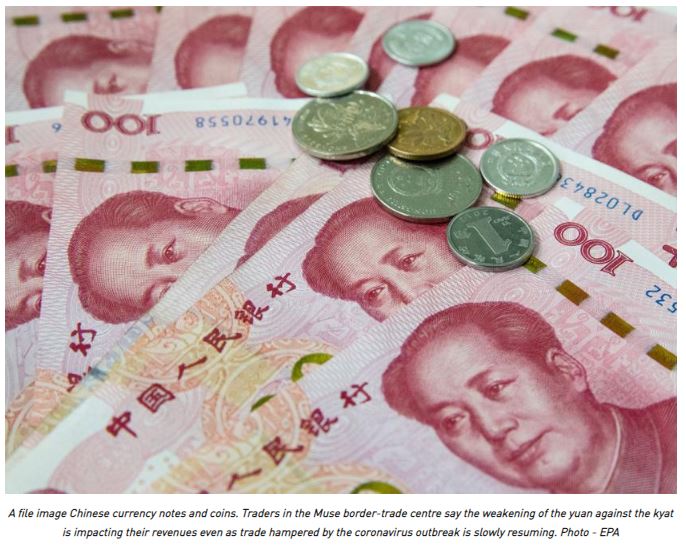Myanmar: Another problem for border trade following virus outbreak
Despite the gradual resumption of border trade between Myanmar and China via Muse in Shan State, the weakening of China’s currency has hit earnings of the traders, say officials in Muse.
According to U Min Thein, vice chair of the Muse Rice Wholesalers Association, as of March 10, the volume of cross-border trade has now rebounded to about 80 percent of the usual before the outbreak of the coronavirus pandemic sweeping the world, but the weakness of the yuan is greatly affecting the revenue of traders.
Before the outbreak of the COVID-19 virus in late December, early January, the exchange rate was 4.90 Yuan for K1000 but by March 10, it had weakened to 5.35 yuan for K1000.
The Central Bank of Myanmar’s reference rate of on January 15 was K214.71 per yuan, but it had strengthened to K197.67 per Yuan by March 10.
Around Muse, the rate had been K220 per yuan earlier in the year but is now only K185 per yuan, said U Sai Khin Maung, vice chair of the Muse Watermelon Wholesalers Association.
“Many Chinese buyers have stopped buying since the depreciation of the yuan against the kyat makes Myanmar’s goods more expensive,” said U Min Thein.
“We still have to deliver goods for deals made earlier and we are usually paid three of four days later after delivery. If the yuan continues to weaken, it could erase much of our profit margins,” he added.
“As the yuan has weakened, the profits of melon traders and growers has been hit. Earlier this year, the melon trade had already been slammed by drastically reduced sales due to the virus outbreak. Now, as exports are slowly resuming, we have been hit by the weak yuan. The entire world’s economy appears to be slowing because of measures taken to curb the virus, so it appears there is very little exporters can do,” said U Min Thein.
According to the traders in Muse, some 30 to 40 truckloads of rice crossed over into China, while exports of watermelons and cucumbers had restarted on March 10.
“Trade has restarted but is not yet fully back to normal volumes. Exports and imports for both countries have not yet returned to pre-virus levels yet and we can’t be certain how long the situation will continue. China’s factories are only now slowly returning to operations and much depends entirely on how the virus outbreak plays out,” said U Sai Khin Maung. – Translated
Source: https://www.mmtimes.com/news/another-problem-border-trade-following-virus-outbreak.html


 English
English




